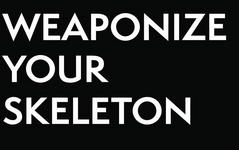You Weigh the Same When You’re Scared

Your skeleton is just as hard, his eye just as soft — regardless of how everyone is feeling.
In the human world — the one that only exists inside our skulls — emotion is power. As we might use a hand to grasp an object so we use emotion to grasp other people’s minds. It lets us reach out and affect behavior; we read it in others to intuit their motives. It’s absolutely necessary for effective communication — without it any message comes across as stilted, creepy, inhuman.
But when we’ve moved beyond communication and into a state of nature where the only thing that will be measured is how physics affects physiology we need a cold, impartial focus because emotions are weightless — they don’t make you heavier, they don’t make you fall any faster in the gravity field, and they don’t make his anatomy any more vulnerable.
Which is to say that a 45-pound Olympic plate dropped awkwardly onto an ankle can break it — and that means you can, too, regardless of how you feel at the moment of impact.
The reverse is also true: His emotional state does nothing to protect him. Personality is not a force field — who he his and what he knows do nothing to shield him from physics. Everyone is susceptible to injury, and those who claim to be immune believe that their ego makes a difference. If they can get you to believe it too, then they win.
While extreme emotion can drive intent to do work (you can “get mad” at a weight or kill someone in a “crime of passion”) it’s a rough, inefficient way to drive effort — like burning an explosive all at once instead of injecting refined fuel into the engine to make diamonds in the exhaust. It’s the difference between a bomb and a rocket.
Intent and intensity ultimately come down to focus, the mind driving effort through the body to wield it as a tool. But emotion can be decoupled from that — you don’t need to get angry at a stalled car to push it as hard as you can.
When thinking about how emotion can drive or hinder effort it’s important to differentiate between biological fear and psychological panic. Fear is the body preparing itself for action — fight or flight — while panic is what happens when the brain goes looking for information on what’s unfolding in front of you… and comes back empty-handed. For example, if you know how to swim and find yourself suddenly dunked into a drowning situation you will feel fear — the adrenal dump, heart racing, changes in perception — and then your brain will go looking for preprogrammed schema (“Is this similar to experiences I’ve had before, either live or in training?”) and you’ll start swimming like an adrenaline-pumped superhuman. If, on the other hand, you don’t know how to swim, your brain comes back with OMIGOD WE’RE GONNA DIE and you start drowning like an adrenaline-pumped animal.
This idea that the brain can only go where it’s gone before is why training matters — you need to practice for the outcome you want so when you find yourself there, literally scared shitless, you sidestep useless panic with actionable information. (Think about it this way: you practice “swimming”, not “drowning”, right? This is why we don’t do “self-defense”. Defense is the drowning of violence.)
Ultimately, all useful interactions in violence come down to pure physics and physiology — and while how you feel about it can alter your ability to act earlier in the chain of events, and affect how efficiently you apply your physics to his physiology, emotion doesn’t change anything at the most fundamental level: you weigh just as much, your skeleton is just as hard, his eye just as soft. Feeling the sudden jolt of biological fear — which, if you’re sane and healthy, you will — can only stop you if decide it can.
I say choose resolve, choose training, cleave into biological fear and wreck him while you’re terrified.
— Chris Ranck-Buhr
Photo: PARCO ARCHEOLOGICO DI POMPEI


Leave a Reply
Want to join the discussion?Feel free to contribute!